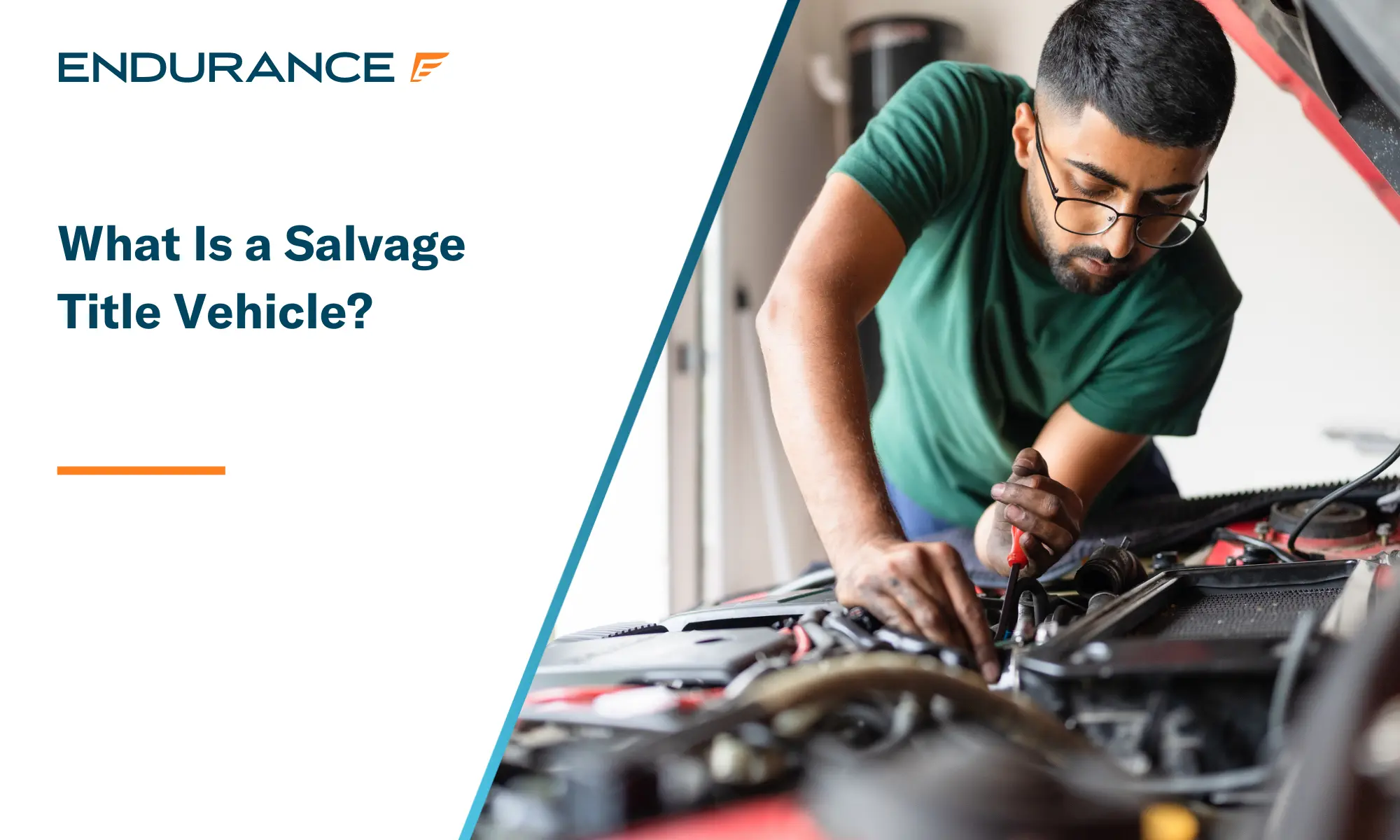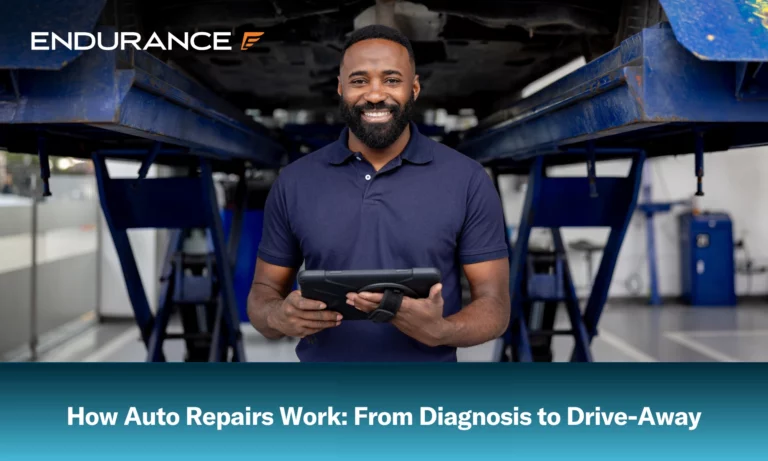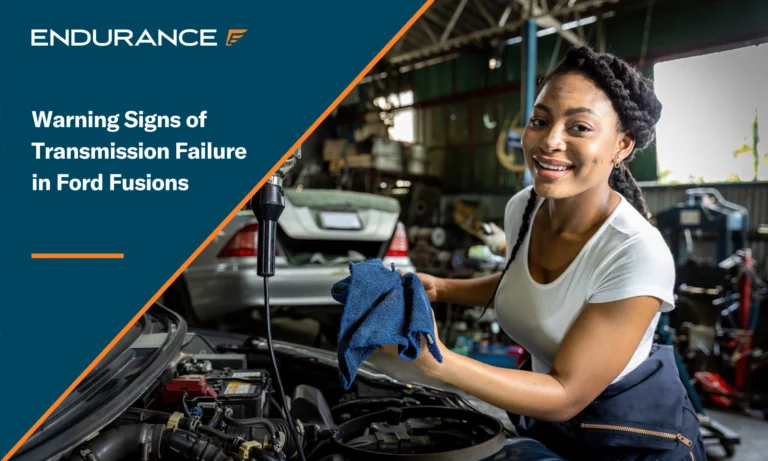¿Qué es un vehículo con título de salvamento?

Al comprar un vehículo usado, es probable que se encuentre con más de una oferta que parece demasiado buena para ser verdad. Aunque algunos compradores de automóviles afortunados encontrarán una gran oferta de vez en cuando, es probable que si encuentra el vehículo de sus sueños a un precio inferior al valor de mercado, vea las palabras "vehículo con título de salvamento" en algún lugar de la descripción.
El título de un vehículo puede brindarle mucha información importante, especialmente sobre el estado del automóvil. Todos los automóviles usados tienen un historial y, cuando se trata de un automóvil con título de salvamento, generalmente hay algunos problemas en el historial del automóvil que debe conocer.
Si un automóvil está en buenas condiciones de funcionamiento y no se han reportado daños importantes, es probable que tenga un "título limpio". Después de un evento catastrófico, como un accidente automovilístico o un desastre natural, una compañía de seguros de automóviles puede considerar que un vehículo es una "pérdida total" o que no vale la pena repararlo. Si el automóvil está "destruido total", el costo de las reparaciones del vehículo es más alto que el valor de mercado del vehículo y se emitirá un título de salvamento.
En última instancia, los criterios que determinan si un vehículo es o no un vehículo designado vehículo con título de salvamento Varía según el caso, la aseguradora y el estado, lo que puede afectar los costos de reparación, reventa y seguro. Sin embargo, aunque un auto de rescate conlleva algunas consideraciones importantes, tampoco siempre significa que esté destinado al depósito de chatarra.
Causas y consideraciones sobre el título de salvamento
Cuando un vehículo dañado ya no es seguro para circular por la carretera, se le puede emitir un título de salvamento. Sin embargo, ese umbral entre apto para circular y no apto para circular varía según el estado y el proveedor de seguros de automóviles. En algunos casos, esto significa que el costo de poner el vehículo en condiciones es mayor que el valor de mercado del vehículo antes del accidente. En otros, significa que las reparaciones del automóvil son más de la mitad del valor justo de mercado. Sin importar la posición de su estado, una vez que su vehículo tiene un título de salvamento, no es legalmente manejable hasta que se completen las reparaciones necesarias.
Lo más común es que un título de salvamento provenga de una declaración de pérdida total debido a un accidente importante. accidente de vehículo de motor Esto da como resultado reparaciones costosas del vehículo. Puede ejecutar un informe del historial del vehículo en línea (como un registro de Carfax o DMV) para encontrar accidentes o problemas. Si su informe muestra un título de salvamento, también puede ser el resultado de:
- Fenómenos climáticos catastróficos (inundaciones, terremotos, granizos, incendios forestales o tornados)
- Robo y recuperación
- Un desastre natural afectó al concesionario de automóviles, pero el vehículo no estuvo necesariamente involucrado
- Piezas de recambio importantes
- Daños por disturbios
- Coche en kit
- Piezas de coche
- El propietario no quería destrozar el vehículo
- Coche antiguo o clásico
Título de salvamento vs. Título reconstruido
Un título de salvamento no es lo mismo que un título reconstruido. Un título de salvamento no está legalmente permitido operar en vías públicasSin embargo, un vehículo siniestro total no necesariamente está destinado a ser desguazado para obtener piezas. A veces, la compañía aseguradora vende el vehículo que ha "siniestrado total" para ayudar a recuperar parte del costo financiero del pago de la reclamación del seguro. En otros casos, el propietario del vehículo puede optar por quedarse con el vehículo. En cualquiera de estos casos, se emitiría un título de salvamento hasta que se realicen las reparaciones. Un título reconstruido significa que, aunque el vehículo alguna vez fue un vehículo con título de salvamento, ahora es seguro para conducir.
Las compañías de seguros y los propietarios de vehículos de rescate pueden solicitar un título reconstruido o reconstruido después de que el vehículo haya sido sometido a las reparaciones necesarias. Una vez que el propietario haya completado extensas reparaciones documentadas y el vehículo pasa una inspección exhaustiva en una estación de inspección calificada, se borrará el estado del título de salvamento y se emitirá un título reconstruido.
Complicaciones de compra
Si está pensando seriamente en comprar un automóvil con título de salvamento, debe comenzar por investigar las leyes de su área. En algunos estados, solo un reparador de automóviles autorizado puede comprar un automóvil con título de salvamento.
Compradores calificados También debería planificar el pago en efectivo de un vehículo de salvamento. Muchos prestamistas no ofrecen préstamos para vehículos en estas condiciones, ya que no hay una rentabilidad garantizada de la inversión. Los prestamistas que financian títulos de salvamento suelen cobrar tasas de interés más altas.
Implicaciones financieras
Comprar un vehículo usado Con un título de salvamento puede ahorrar mucho dinero al comprar un automóvil. De hecho, un título de salvamento a menudo reduce el precio de venta solicitado por el vendedor entre un 5% y un 10% por debajo del valor de mercado actual de un vehículo con título limpio. Sin embargo, ahorrar dinero por adelantado puede no valer la pena debido a las implicaciones financieras a largo plazo.
Para empezar, según Kelly Blue Book (KBB), un vehículo con título de salvamento vale entre 20% y 40% menos que su equivalente con título de propiedad sin impagos. No solo existe la posibilidad de una valoración negativa inmediata, sino que también hay otras cuestiones financieras que considerar, entre ellas:
- Costos iniciales de reparación Para que el vehículo esté en condiciones de circular
- Costos para inspeccionarlo y tasarlo
- Primas de seguro de automóvil costosas, si puede encontrar una aseguradora
- Tasas de financiación de los prestamistas más altas
- Menor probabilidad de venta
Preocupaciones de seguridad
Desafortunadamente, con los vehículos con título de salvamento, también hay preocupaciones de seguridad inherentes a tener en cuenta. Alcance del daño Puede extenderse mucho más allá de lo que se ve en la superficie e incluso puede extenderse a la estructura del vehículo. Muchos de los modelos de vehículos actuales están diseñados para flexionarse, doblarse y absorber el impacto durante un accidente. Desafortunadamente, en la mayoría de los casos, el marco no se puede doblar para volver a su lugar sin perder la integridad estructural. Incluso si se puede hacer, el material se debilita y no está aprobado para protegerlo a usted o a sus pasajeros en caso de impacto.
En algunos casos, el daño puede no ser identificado. Por ejemplo, en caso de daños por inundación, los daños graves pueden pasar desapercibidos durante meses o incluso años antes de ser descubiertos. La humedad, el moho y la corrosión suelen estar ocultos debajo de los asientos, las alfombras y en zonas difíciles de ver, lo que los convierte en lugares privilegiados para pasar desapercibidos durante más tiempo, lo que agrava el daño por inundación.
Atención al comprador: evaluación de vehículos con título de salvamento
¿Encontró una oferta de un vehículo con título de salvamento que es demasiado buena como para dejarla pasar? Los vehículos de salvamento suelen tener daños ocultos, dificultades imprevistas con el seguro y problemas de reventa, por nombrar solo algunos de los obstáculos que puede enfrentar.
Antes de firmar cualquier contrato de compra, debe saber en qué se está metiendo. Dado que los autos con título de salvamento son más difíciles de vender, debe estar preparado para conducirlos, para bien o para mal, hasta que se caigan las ruedas. Puede reducir el riesgo de heredar un pozo de dinero haciendo la debida diligencia antes de comprar un auto de salvamento.
3 consejos para comprar un vehículo con título de salvamento
Pruebe estos pasos para Ahorre tiempo, dinero y frustración con el coche equivocado:
1. Realice inspecciones exhaustivas del vehículo
Como regla general, es una buena idea realizar una inspección del vehículo antes de comprar un vehículo usado. Ya sea que compre un vehículo de un concesionario de autos usados o de un vendedor privado, es importante que un profesional lo inspeccione para detectar cualquier problema mecánico, de seguridad o estético. No solo es una inspección minuciosa examen de diagnóstico una herramienta valiosa en sus negociaciones de precios, pero la inspección previa a la compra (PPI) garantiza que el vehículo sea seguro para conducir o, en el caso de un vehículo de salvamento, que usted esté al tanto de todas las reparaciones necesarias.
2. Obtenga un informe del historial del vehículo
¿Se le cambiaron regularmente el aceite al vehículo antes de obtener el título de salvamento? ¿Qué reparaciones se realizaron? ¿Las realizó un profesional? Mecánico certificado ASE¿Taller de carrocería o taller de reparación de vehículos?
Aunque el vendedor puede tener una amplia experiencia en la reconstrucción de automóviles como pasatiempo, los historiales detallados de reparación del vehículo pueden marcar la diferencia en la tasación e inspección del vehículo para determinar si está en condiciones de circular. Si el vendedor no tiene prueba de reparacionesPuede utilizar sitios web como vehiclehistory.gov, carfax.com, autocheck.com o vinaudit.com para consultar los registros de mantenimiento y reparaciones. Asegúrese de que las reparaciones las realice un profesional capacitado con repuestos de alta calidad.
3. Consulta con profesionales de la reparación de automóviles
Al comprar un vehículo usado, usted acepta comprar un vehículo tal como está, sin garantía (a menos que le hayan ofrecido una) garantía extendida del automóvil por un concesionario de automóviles o un Proveedor de garantía de terceros, como Endurance). Aunque todos esperamos que el vendedor sea honesto con nosotros, es responsabilidad del comprador tomar las medidas necesarias para asegurarse de que el vehículo sea lo que desea. El trato se concreta una vez que haya pagado al vendedor y cualquier reparación será su responsabilidad financiera.
Por lo tanto, es importante hablar sobre el vehículo con un mecánico de confianza. Hágale saber cuáles son sus objetivos para el vehículo y permítale ofrecerle comentarios honestos sobre si se trata o no de una buena inversión en función de sus necesidades y estilo de vida.
Cómo rehabilitar un vehículo con título de salvamento
Aunque un coche de salvamento puede tener daño sustancialHay pasos que puede seguir para eliminar el estado del título de salvamento. Puede solicitar un título reconstruido cuando esté listo para que su vehículo vuelva a circular, pero antes de solicitar un título nuevo, debe seguir estos pasos:
Realizar las reparaciones necesarias
El primer paso para reconstruir un título de salvamento es realizar las reparaciones necesarias. Ya sea que necesite un motor reconstruido, puertas nuevas, ruedas o un parabrisas nuevo, el vehículo debe considerarse seguro para circular, no solo para el conductor y sus pasajeros, sino también para otras personas en la carretera. Asegúrese de documentar todas y cada una de las reparaciones realizadas durante el proceso con recibos y fotografías del antes y el después. Esto ayudará con la siguiente fase.
Pasar una inspección del vehículo
Antes de poder conducir legalmente su vehículo reconstruido, un La estación de inspección debe realizar una inspección exhaustiva Para asegurarse de que no se haya pasado nada por alto. Dado que aún no está homologado para circular, lleve su vehículo en grúa a una estación de inspección de confianza. Asegúrese de llevar toda la documentación necesaria, como:
- Contrato de venta
- Identificación con fotografía
- Número de identificación del vehículo (VIN)
- Fotos del progreso (antes y después)
- Título
- Recibos de repuestos y servicios
Solicitar un título reconstruido
Una vez que su vehículo con título de salvamento pase la inspección, podrá solicitar oficialmente un título reconstruido o reconstruido. Cada estado tiene requisitos de formulario y tarifas únicos, así que asegúrese de consultar los requisitos de su estado antes de dirigirse a la oficina de títulos.
Garantías extendidas y títulos de salvamento
Comprar un garantía extendida para vehículos de salvamento Puede ser un desafío. La mayoría de los proveedores de garantía extendida excluyen los autos con título de salvamento de sus planes de cobertura de garantía porque existe un mayor riesgo de averías mecánicas inesperadas (y a menudo costosas). Si bien encontrar una garantía extendida para autos, también conocida como plan de protección para autos o contrato de servicio para vehículos, puede ser difícil, no es imposible.
A diferencia de otros proveedores de garantías, Endurance Warranty ofrece opciones para los propietarios de vehículos que buscan proteger su vehículo reconstruido o rehabilitadoLos autos de rescate que hayan sido reconstruidos pueden ser elegibles para planes de cobertura de garantía útiles. Sin embargo, es posible que se le pida que demuestre lo siguiente:
- Documentación del proceso de reconstrucción (piezas utilizadas, mecánico de confianza, etc.)
- Inspección satisfactoria
Nuestro Endurance Plan de protección de automóviles Advantage ofrece muchos beneficios para vehículos rescatados o reconstruidos. Ventaja ofrece protección integral, que incluye hasta $3,500 al año en mantenimiento de rutina y cambios de aceite. Además, cada plan de garantía Endurance incluye beneficios adicionales como asistencia en carretera y remolque las 24 horas, los 7 días de la semana, cobertura por interrupción de viaje y reembolso por alquiler de vehículos.
Puede optar por maximizar sus ahorros activando el paquete de beneficios Elite Endurance por una tarifa de activación única. Con esto, ahorrará aún más en reemplazo y rotación de neumáticos, reemplazo de llaveros y más.
Pros y contras: ¿Es un vehículo con título de salvamento adecuado para usted?
Si está decidiendo si un vehículo con título de salvamento es la mejor opción para su estilo de vida, es importante considerar cuidadosamente todos los riesgos y responsabilidades asociados con la propiedad de un vehículo con título de salvamento. Exploraremos algunos de los pros y contras de poseer un vehículo con título de salvamento.
Pro: Ahorro
Si está buscando comprar un vehículo nuevo o usado, probablemente haya visto que el precio de los vehículos ha aumentado en los últimos años. Comprar un automóvil con un título de salvamento es una forma de obtener un vehículo nuevo a un precio reducido.
Desventaja: Costos de reparación
Si bien comprar un vehículo con título de salvamento puede ahorrarle dinero al principio, no es legal conducirlo hasta que se le hayan realizado reparaciones importantes. El proceso de reparación e inspección requiere tiempo y dinero, y ambos pueden contrarrestar los ahorros iniciales en la compra.
Pro: Consigue el coche de tus sueños
Si está decidido a adquirir un vehículo antiguo difícil de encontrar, es probable que los que están en buenas condiciones ya pertenezcan a otros coleccionistas. Si siente nostalgia o sueña con tener un muscle car clásico o un vehículo poco común, un vehículo de rescate puede ser la solución ideal. Puede encontrar un vehículo que necesite reparaciones y que funcione como nuevo.
Contra: Problemas de seguridad
Cualquier vehículo que haya sufrido daños suficientes como para que se lo considere recuperado puede tener algunas consideraciones de seguridad. Incluso si un automóvil se puede reparar, querrá asegurarse de que solo se utilicen piezas de la más alta calidad y que el trabajo lo realice un profesional o un Mecánico certificado ASE para evitar posibles fallos mecánicos.
Pro: Creando recuerdos
Si prefieres hacerlo tú mismo y esforzarte para sentir la sensación de logro que puede surgir al terminar un gran proyecto, un vehículo rescatado puede ser un excelente pasatiempo para comenzar.
Desventaja: Complicaciones del seguro
Asegurar un vehículo con título de salvamento también puede ser un desafío. A menudo, debido a que el vehículo no vale tanto como su alternativa sin título, muchas compañías de seguros de automóviles no aseguran vehículos con título de salvamento, y las que lo hacen suelen hacerlo con una prima más alta.
Desventaja: Valor de reventa futuro
Lamentablemente, el mercado para vender un título de salvamento o reconstruido es pequeño debido a los riesgos asociados inherentes. Si compra un automóvil con título de salvamento, debe planificar conservarlo o incluso transmitirlo a las generaciones futuras.
Pregunte por la garantía Endurance para vehículos con título de salvamento
Cualquier vehículo puede averiarse inesperadamente, pero los vehículos con título de salvamento pueden ser más susceptibles debido a sus daños anteriores. No se deje sorprender con otra factura de reparación de automóvil inesperada y costosa. Plan de protección automática Endurance Es justo lo que necesitas.
Llamar (800) 253-8203 a Solicite una cotización GRATIS para su vehículo recuperado o reconstruido. Nuestros asesores de planes pueden ayudarlo a personalizar la cobertura según sus necesidades y su presupuesto. Si tiene poco tiempo, también puede tienda en linea para ver su precio inmediatamente.
También puede visitar nuestro centro de aprendizaje para obtener respuestas a más preguntas frecuentes, como Qué esperar de un motor reconstruido, ya sea o no Comprar un coche destrozado es una buena idea, y mucho más.













Desde los 16 años, Keith ha estado inmerso en la industria automotriz, comenzando su carrera ayudando a su padre a reparar vehículos a una edad temprana. Keith ahora es dueño de su propio taller de reparación familiar certificado por ASE. A+ Cuidado del automóvilEn su tienda, se centra en construir relaciones de confianza con su comunidad a través de un servicio al cliente excepcional. Leer más Acerca de Keith.